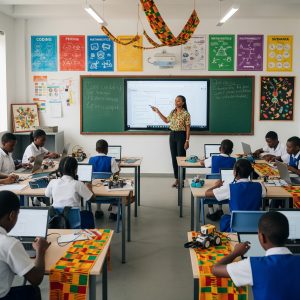While significant progress has been made, there are still challenges that need to be addressed to further enhance the success of the Ghana Education System.
Resource Allocation and Infrastructure
Despite efforts to improve ICT infrastructure, there are still disparities in resource allocation, particularly between urban and rural schools. Rural schools often face challenges such as inadequate classroom facilities, insufficient teaching materials, and a lack of access to modern technology. These disparities can hinder the ability of students in rural areas to fully develop 21st-century skills. To address this issue, the government needs to allocate more resources to rural schools and ensure that they receive the necessary support to create a conducive learning environment.
Teacher Quality and Retention
Ensuring the quality and retention of teachers is another critical challenge. Teachers in Ghana, especially those in remote and rural areas, may face difficult working conditions, limited career advancement opportunities, and inadequate remuneration. These factors can lead to high turnover rates and a shortage of qualified teachers. To improve teacher quality and retention, the government should consider providing better incentives, such as higher salaries, housing allowances, and professional development opportunities. Additionally, creating a supportive work environment and recognizing the contributions of teachers can help boost morale and encourage long-term commitment to the profession.
Continuous Curriculum Review
The curriculum must be continuously reviewed and updated to keep pace with the rapidly changing global landscape. Incorporating more hands-on, project-based learning experiences can further enhance students’ critical thinking and problem-solving abilities. However, the process of curriculum review and implementation can be time-consuming and resource-intensive. It requires collaboration among educational experts, policymakers, and teachers to ensure that the curriculum remains relevant and effective. Providing ongoing training and support for teachers to adapt to new teaching methods and technologies is also crucial for the successful implementation of curriculum changes.
Need to introduce and develop a more appropriate pedagogy
Currently in the classroom, Teachers are under tremendous pressure to cover the syllabus within the given period and implement four evaluations of learners’ progress in the term. Teachers are also expected to teach such that the learner will successfully pass these evaluative assessments. As such, there are numerous reports of ‘chew and pour’ teaching and learning practices occurring in the classroom. Additionally, an increase in cheating to pass involves not only individual learners but also schools seeking to improve their results.
Need to take Politics out of Education
For a number of years, there have been frequent policy changes within the education system, introducing a bewildering array of new initiatives that teachers and schools are expected to implement. At the same time teachers and schools have in recent years been prohibited by the government of the day from making any public comments to the media about challenges they are encountering. Results of major public exams have been massaged to appear good. For example at the BECE level there is no fail; the lowest grade is a pass. However, this level of performance does is below what could be considered acceptable.
Conclusion
In conclusion, the Ghana Education System has made commendable progress in producing students equipped with 21st-century skills. Through various reforms and initiatives, significant strides have been made in improving access to education, promoting STEM education, and integrating digital literacy. However, continued efforts are required to address existing challenges and ensure that every Ghanaian student is well-prepared for the demands of the modern world.
Resources
- Ministry of Education, Ghana. (2020). Annual Report.
- Ghana Education Service. (2019). Transition Rate Statistics.
- Trends in International Mathematics and Science Study (TIMSS). (2019). Ghana Report.
- Ghana Robotics Academy Foundation. (2019). Competition Results.
- Billings, T. 2021, 21st Century Skills Every Graduate Must. Jobberman January https://www.jobberman.com.gh/discover/21st-century-workplace-skills#:~:text=The%20full%20list%20of%2021st,curiosity%2C%20imagination%2C%20innovation%2C%20and%20personal


